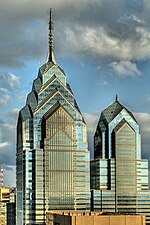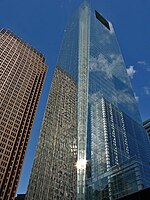Comcast Corporation (formerly known as American Cable Systems and Comcast Holdings), headquartered in Philadelphia, is the largest American multinational telecommunications conglomerate. It is the second-largest broadcasting and cable television company in the world by revenue (behind AT&T), the largest pay-TV company, the largest cable TV company and largest home Internet service provider in the United States, and the nation's third-largest home telephone service provider. It provides services to U.S. residential and commercial customers in 40 states and the District of Columbia. As the parent company of the international media company NBCUniversal since 2011, Comcast is a producer of feature films for theatrical exhibition, and over-the-air and cable television programming.
Comcast owns and operates the Xfinity residential cable communications subsidiary, Comcast Business, a commercial services provider; Xfinity Mobile, an MVNO of Verizon; over-the-air national broadcast network channels (NBC, Telemundo, TeleXitos, and Cozi TV); multiple cable-only channels (including MSNBC, CNBC, USA Network, Syfy, Oxygen, Bravo, and E!); the film studio Universal Pictures; the VOD streaming service Peacock; animation studios (DreamWorks Animation, Illumination, Universal Animation Studios) and Universal Parks & Resorts. It also has significant holdings in digital distribution, such as thePlatform, which it acquired in 2006; and ad-tech company FreeWheel, which it acquired in 2014. Since October 2018, it has also been the parent company of Sky Group.Comcast has been criticized for a variety of reasons. Its customer satisfaction ratings were among the lowest in the cable industry during the years 2008–2010. It has violated net neutrality practices in the past, and, despite its commitment to a narrow definition of net neutrality, critics advocate a definition that precludes any distinction between Comcast's private network services and the rest of the Internet. Critics also point out a lack of competition in the vast majority of Comcast's service areas; in particular, the limited competition among cable providers. Given its negotiating power as a large ISP, some suspect that it could leverage paid peering agreements to unfairly influence end-user connection speeds. Its ownership of both content production (in NBCUniversal) and distribution (as an ISP) has raised antitrust concerns. These issues and others led to Comcast being dubbed "The Worst Company in America" by The Consumerist in 2010 and 2014.








